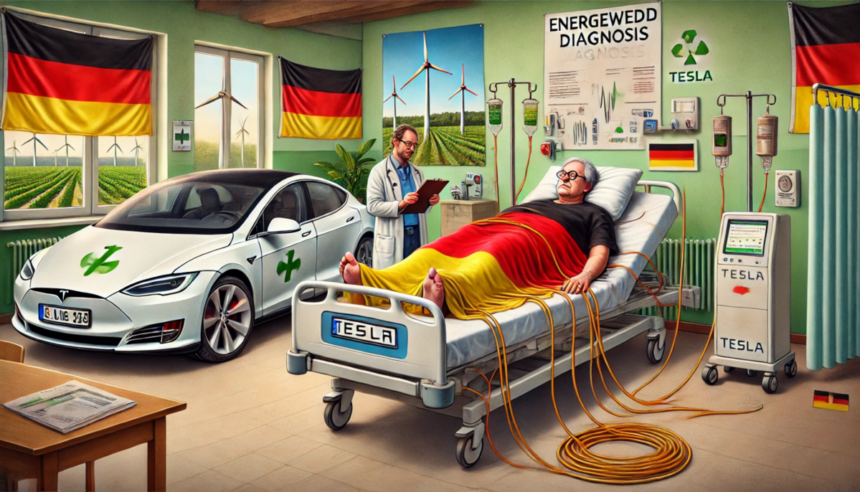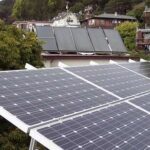Germany’s energy transition has made significant progress in recent years, particularly in the expansion of renewable energy. However, during periods of “periods of low wind and solar energy (so-called ‘Dunkelflaute‘),” when both wind and solar energy are scarce—an issue that has occurred twice within the last 30 days—the weaknesses of the current energy infrastructure become glaringly evident. A recent ZDF report titled “Dunkelflaute lässt Strompreise explodieren” highlights this problem and demonstrates how vulnerable the system is to such challenges. Some experts suggest using electric vehicles to supply power to Germany in these situations. However, to make a meaningful contribution, approximately 114,048 GWh of additional battery storage capacity would be required. This corresponds to about 2,280,968 electric vehicle batteries (with an average capacity of 50 kWh each). The estimated cost for this capacity is approximately €16.2 billion.
These figures illustrate the immense challenge of achieving comprehensive coverage solely with electric vehicles. A full supply from renewable energy sources would require far greater storage capacities and significantly modernized grid structures. A closer look at the numbers reveals the sobering truth: without massive infrastructure expansion, such scenarios remain purely theoretical.
The Role of Energy Storage: A Sobering Analysis
One of the central problems of the energy transition is the lack of storage capacity. Germany currently has a total storage capacity of about 51.62 gigawatt-hours (GWh). In comparison, the final energy consumption in 2023 was approximately 11.41 exajoules (EJ), equivalent to 11,410,000 GWh. This means that existing storage can cover only 0.00045% of annual energy consumption.
This figure underscores that, even after 20 years of energy transition in Germany, storage capacities are far from sufficient to even partially bridge a dark doldrum. Additionally, in 2023, around 19 terawatt-hours (TWh) of energy were lost due to grid bottleneck management caused by insufficient storage capacity. These losses resulted in costs of nearly €3.1 billion, emphasizing the urgency to rethink this issue and expand energy storage. Expanding renewable energy alone is not enough if energy storage is neglected.
Why Storage Technologies Are Crucial
A sustainable energy supply requires storage solutions that:
- Provide long-term energy storage: Technologies such as pumped-storage plants or hydrogen storage can hold energy for weeks and months. However, in recent years, these storage options have been significantly reduced in Germany.
- Are flexible and ready for use: Battery storage can balance short-term fluctuations but is not sufficient for prolonged blackouts.
- Are scalable and cost-efficient: Current investments in storage technologies lag far behind the actual need.
The Impact of Dark Doldrums: Price Explosions and Production Halts
The blackout in December 2024 drove electricity prices to over €900 per megawatt-hour (MWh). Many businesses were forced to reduce production to cope with the high costs. Such extreme situations highlight how vulnerable the energy system is when relying on renewable energy without adequate storage.
What Needs to Be Done?
- Urgent expansion of storage technologies: Without a massive increase in storage capacity, the system remains vulnerable, unable to counteract massive energy losses during the summer months.
- Investments in research and development: New storage technologies, such as thermal storage or power-to-X systems, must be prioritized.
- Hybridizing energy sources: Natural gas, biomass, or nuclear energy as transitional solutions could ensure supply security.
- Political frameworks: Subsidies for storage technologies and transparent pricing models are essential.
- Exploring new possibilities for ground-level wind turbines in mountainous areas: Particularly in mountainous regions, using ground-level wind turbines could be an efficient addition to existing solutions, as ground-level winds are often significantly more energy-rich.
Conclusion: An Energy Transition Without Storage and Innovative Solutions Leads to Energy (Dead) Ends
Germany’s energy transition has ambitious goals, but the reality reveals critical missing elements. The minimal contribution of energy storage to overall energy consumption exposes a fundamental weakness in the system. To bridge blackouts and ensure a sustainable energy supply, storage technologies must take center stage. Otherwise, the energy transition in its current form will fail to solve the supply challenges.




